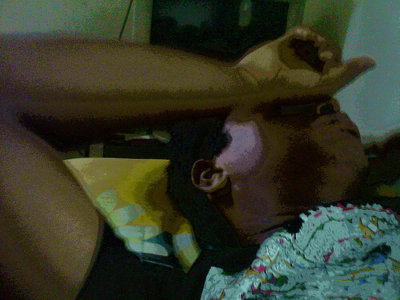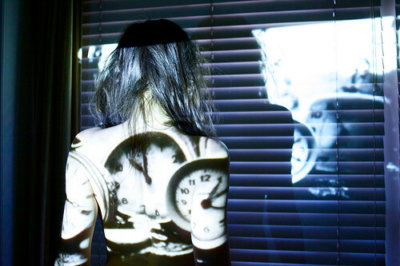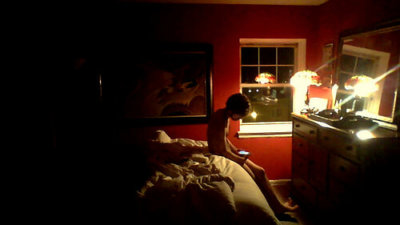Anxiety at Night – Is This Your Problem?

By: slεεpµ╬dεmoñ™
by Andrea M. Darcy
Do you wake up once or several times a night and find it hard to fall back to sleep? Is your heart racing? And, more importantly, your mind, too?
You might be suffering from anxiety at night.
Is anxiety at night really anxiety?
Night anxiety is the same as anxiety in the day, it’s just that it’s anxiety you have managed to avoid in the daytime by keeping busy. At night, with less to do, it rises up to be acknowledged.
If night anxiety is a long-term occurrence for you, it’s even possible your nightly panic time is a sign you have an anxiety disorder.
Symptoms of night anxiety
While we all experience stress in life that is enough to occasionally give us a bad night’s sleep, night anxiety is different.
Like all other forms of anxiety, it does not arise from a definite event like stress, but is a spiral of negative and often racing thoughts that can involve anything and everything.
These thoughts tend towards illogic (called ‘cognitive distortions’ in psychology) and often lead to catastrophic ‘worst case scenarios’.
So while stress might be thinking about the genuinely challenging presentation you have to give the next day, anxiety would be worrying about what you said at a diner party, followed by a panic that the outfit you bought for an upcoming wedding is all wrong, followed by thinking about how much it cost and then suddenly feeling full of terror you’ll never have enough money to retire and will end up wandering the streets and crazy.

By: katieg93
[Read our article on stress vs anxiety to have a clearer picture of the difference between the two.]
Anxiety also has a very real physical side. Such symptoms can include:
- heart palpitations
- restlessness
- sweating
- muscle tension
- energy/adrenaline rushes
- jaw clenching.
Tossing and turning in your bed and listening to your heart pounding, your very anxiety itself might lead to even more anxiety, such as catastrophic thoughts about having a heart attack, or despairing about ever sleeping again and worrying about what negative things your lack of sleep will cause to happen following day.
[For more symptoms of anxiety, read our guide to generalised anxiety disorder (GAD).]
But how can I have night anxiety if I am calm and ok in the daytime?
Again, it’s not that you don’t have anxiety in the day time. It’s just that you are the sort who can distract yourself.
When it comes time to sleep, we are finally alone and in quiet, and all the thoughts we suppress in the day are harder to avoid (not helped by the fact that there is less going on in our brains, which then become more susceptible to anxiety-supporting cortisol).
The end of the day also lacks the potential for things to happen we can rely on in the daytime. With nothing else to do for several hours but sleep, it can seem easier to feel hopeless.
Can I have day anxiety and also anxiety at night?
Yes. You might have low-level anxiety in the day, for example, and night anxiety in the evening.
Or you might have only occasional bouts of night anxiety but consistent anxiety in the daytime.
This said, often those who have night anxiety are high performers in the day who don’t seem to have a problem. It’s almost as if their very capacity to ‘keep it together’ means they are prone to hidden night anxiety, falling to pieces in the privacy of their bedroom.
Is anxiety at night worse than day anxiety?
Anxiety is never fun, and the intensity of the experience is more down to the individual than whether it occurs in the night or day.
Of course things can just seem more dangerous and hopeless when the world is in darkness, and at night when others are sleeping there is less opportunity to seek support, such as calling a friend or talking to your spouse or partner.
And night anxiety robs you of necessary sleep. Each night you can’t sleep can leave you more exhausted, fractious, moody, and unorganised, furthering your anxiety.
Lack of sleep can also leave your immune system compromised and your appetite out of control. Weight gain and constant colds can make you even more anxious, and the spiral continues.
Finally, night anxiety can be harder for others to understand. If they don’t ‘see’ you suffering anxiety, they might not take you seriously when you try to ask for their support.
But I fall asleep easily then wake up in the middle of the night. Is it anxiety?
For some people anxiety in the night manifests in cycles of sleep and wakefulness, with bad dreams when asleep followed by waking up feeling as if you are mid panic attack.
But if this is your pattern of anxiety, be sure to rule out other similar conditions that have a similar pattern of sudden wakefulness.
Can night anxiety be misdiagnosed?
There are other conditions that are similar to night anxiety so it’s important to rule them out.
Menopause and perimenopause are also something to consider. They can cause anxiety as well as night time sweating and heart palpitations.
Sleep apnea, a condition where breathing patterns are inconsistent when sleeping, can lead to waking up with a start and gasping for breath. This can of course lead to sudden anxiety.
Night terror is a sleep disorder that sees you jolt awake once or several times a night with a racing heart and a sense of fear. There is however a comorbidity factor between night terror and anxiety in adults, meaning you can have both at the same time.
What do I do if I have night anxiety?
There are many popular recommendations for night anxiety. These can include:
- getting out of bed if the anxiety continues and doing something distracting
- having a light snack
- practising mindfulness meditation or progressive muscle relaxation
- learning to challenge your thoughts
- resist looking at the clock (and panicking more)
- exercising more (but not near bedtime).
Good sleep hygiene is also recommended, including refraining from using technology in the hours leading up to bedtime, making sure your bedroom is dark and cool, limiting caffeine and alcohol, and having a good mattress.
What about seeking support?
Anxiety can feel life-ending when we are in the throes of it, but it’s actually a condition that responds well to talk therapy treatment.
Cognitive behavioural therapy (CBT) has been found to be particularly effective, helping you to recognise your negative thoughts, challenge them, and replace them with more balanced and less anxiety-inducing ones.
Harley Therapy connects you to experienced and friendly CBT therapists in central London, or from anywhere you are via online counselling.
 Andrea M. Darcy is a health and wellbeing writer as well as mentor, trained in person-centred counselling and coaching. She suffers night anxiety herself! Find her on Instagram @am_darcy
Andrea M. Darcy is a health and wellbeing writer as well as mentor, trained in person-centred counselling and coaching. She suffers night anxiety herself! Find her on Instagram @am_darcy





